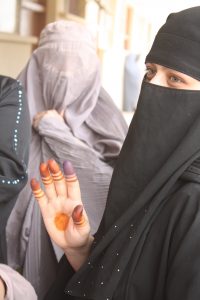Memo #284
By Dur-e-Aden – dur-e-aden [at] hotmail.com
 This week Afghans headed to the polls to help usher in a transfer of power from one democratic government to the next. While some observers hail this as a major achievement, others worry what lingering issues of rampant Taliban violence, ethnic politics, widespread corruption and fraud during the elections mean for the future of Afghanistan’s democracy. Leading up to the vote, Taliban regularly attacked targets linked to the elections in order to intimidate voters and disrupt the electoral process. Meanwhile, none of the candidates in the elections openly condemned the Taliban violence. In fact, some were accused of using the Taliban to disrupt rival campaigns or of shying from speaking up against them in order to protect their own campaigns. This reminds us that we perhaps need to lower our expectations concerning the fairness and cleanliness of the Afghan electoral process. Three of the “moderate” frontrunners (a former Johns Hopkins Professor, a French-trained physician, and an ophthalmologist) deliberately chose figures from other ethnic groups and former warlords as their running mates to broaden their support bases. Moreover, selective patronage was openly used as a campaign tool.
This week Afghans headed to the polls to help usher in a transfer of power from one democratic government to the next. While some observers hail this as a major achievement, others worry what lingering issues of rampant Taliban violence, ethnic politics, widespread corruption and fraud during the elections mean for the future of Afghanistan’s democracy. Leading up to the vote, Taliban regularly attacked targets linked to the elections in order to intimidate voters and disrupt the electoral process. Meanwhile, none of the candidates in the elections openly condemned the Taliban violence. In fact, some were accused of using the Taliban to disrupt rival campaigns or of shying from speaking up against them in order to protect their own campaigns. This reminds us that we perhaps need to lower our expectations concerning the fairness and cleanliness of the Afghan electoral process. Three of the “moderate” frontrunners (a former Johns Hopkins Professor, a French-trained physician, and an ophthalmologist) deliberately chose figures from other ethnic groups and former warlords as their running mates to broaden their support bases. Moreover, selective patronage was openly used as a campaign tool.
Nevertheless, Afghans demonstrated their faith in democracy by coming out to vote in the first round of elections and in the final round this week. Some observers genuinely worried that allegations of fraud might make people lose faith in the process, but we need to keep in mind that ordinary Afghans are well aware of these problems. Yet, by defying Taliban threats and participating in the process knowing that it would not be 100% fair, they have shown their resolve to be involved in the affairs of their country.
The new Afghan leader will be responsible for assuring security following NATO withdrawal, reviving a fledgling economy, dealing with the Taliban insurgency and handling Afghanistan’s relations with regional and global players. It’s unrealistic to expect these problems will be manageable by the Afghan government alone. Therefore, major international players need to do their part in carefully facilitating (not imposing) the crucial steps of transition in Afghanistan. Even though war fatigue in the West is real and understandable, the last time Afghanistan was abandoned the consequences were drastic. We should not repeat this mistake.
About the Author:
Dur-e-Aden is a MA student in the Department of Political Science at the University of British Columbia.
-
Links:
- Radio Free Europe/Radio Liberty, “Tea, Soup, Sweets—And A Little Bakshish—Crucial To Afghan Campaigning,” March 2014
- The New Yorker, “Rigging the Afghan Vote,” April 2014
- Barnett R. Rubin, “The Election is the Enemy,” Foreign Policy, April 2014
- Paul D. Miller, “Afghanistan’s coming coup?” Foreign Affairs, April 2014
- United States Institute of Peace, “Don’t Underestimate Afghanistan’s Young Voters,” April 2014
Related memos:
See our other memos on Afghanistan.

Comments are closed, but trackbacks and pingbacks are open.